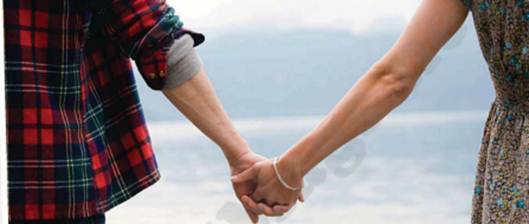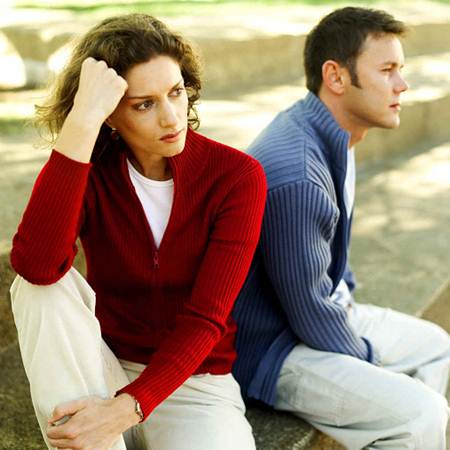Faced with a serious illness, the one person
you would expect to support you is your partner. Sadly, research shows that
women who fall ill are far more likely to end up alone than men. Our advice can
help you to pull through the trauma together.
When she decided to move to France with her
family to open a bed and breakfast, Miranda* imagined an idyllic future ahead.
She and her husband Liam* found the perfect house with beautiful gardens and a
pool, and began their new life with her teenage daughter in March 2005. But two
months later, her dreams were shattered she had breast cancer at the at the age
of 50. And she had no idea, at that point, that her marriage was in danger,
too.

Would
you be in it together?
‘When I was first told I might have breast
cancer, I rang Liam immediately, and he rushed from work at breakneck speed. He
was very caring and supportive throughout all the testing. When we collected
the biopsy results together, he comforted me, held my hand and told me not to
worry, because we would cope, whatever happened.
‘But over the next weeks and months, his
behaviour started tochande. He became snappy and impatient if I needed help
with the household chores, and the day I came out of hospital after my
lumpectomy in June, he insisted I help look after our guests in the bed and
breakfast. All I wanted to do was go straight to bed, but I remember his exact
words: “Come on, I have done all the cooking, the least you can do is come and
talk to them!”
‘I was not allowed time to recuperate, and
it was aleays my daughter who looked after me. He became very controlling and
aggressive- once, we argued so much the I had a panic attack and could not
breathe. Feeling so stressed and trapped made me desperately unhappy, and I
knew that although I’d survived, mu marriage would not. I realised I did not
want to be in France with Liam, but back in the UK with my daughter and the
rest of my family. They were the ones who had truly stood by me and never let
me down. Liam and I finally divorced in 2011. It was the breast cancer that
made us split up, but I now realise that my diagnosis brought out a side of
Liam’s personality that was already there. I am now much happier, free from
cancer, and sharing a flat with my daughter in England.’

‘In
sickness and in health’- is not that what we vowed?
Miranda’s experience is far from unusual.
We often think that if the worst happened and we fell ill, at least our
marriage would remain stable and our partner would stang by us, as we eould
stand by him. ‘In sickness and in health’- is not that what we vowed? But
sadly, this is not always the case. According to the report Worried Sick,
published by the cancer charity Macmillan, a third of patients say their
relationships are under enormous strain, and women with cancer are far more
likely to lose their partners than men in the same situation. A major American
study found that a married woman who is diagnosed with a serious disease is six
times mor likely to be divorced or separated than a man with the same
diagnosis.
As a Relate counsellor with 20 years’
experience, Jeannie Coleman works for Macmillan to provide relationship support
for anyone affected by cancer. ‘When the spotlight is turned on to mortality,
it is not unusual for one half of the couple to re- evaluate the relationship.
If a marriage is struggling can often reach crisis point,’ she explains. The
charity Breast Cancer Care has produced a booklet, In It Together, aimed at
helping the partners of people with breast cancer to tackle these issues.
According to Jeannie Coleman, many couples can grow closer after pulling
through difficult times.
Claire and David Senior had been living
together for nine months when, in September 2005, Claire was diagnosed with
mouth and tongue cancer at the age of 31. She decided to give David the
opprtunity to end their relationship: ‘With my young daughter Dani to care for,
I knew it was a lot for him to deal with, and it was going to be tough. I did
not want him to stay because he felt obligated, so when we got home, I just
said that if he wanted to walk away and move on with his life, I’d understand.
When he said “Do not be effing ridiculous!”- well, he could not have given me a
better answer. That was it- we were in this together.’

‘I
was told that only your parents will give you uncoditional love. But David is
the exception
There was never any doubt in David’s mind
that he would stay with Claire to support her and her daughter. He acted as a
single parent during Claire’s surgery and, while she was recovering and could
not speak, sat by her bed, writing her notes to tell her how much he loved her
and that everything would be all right. But there were some very difficult
moments. ‘When the consultant told us it was cancer, it felt like a train had
just run me over,’ says David. ‘We tried to keep positive, but there were times
when it got really, really tough. Surviving on one income made things even more
stressful. The lowest point came when I was lying awake in bed while Claire had
her surgery, thinking about the worst that could happen. I just felt so
helpless- I wanted to fix her, but I am not a doctor, and there was nothing I
could do.’
Two years on from her diagnosis, Claire has
made a full recovery, and the couple is married with a little boy, Oscar. David
says: ‘Ofcourse we would have married had she not had cancer, but it solidified
our relationship. I know now that if we hit another crisis, we will be even
stronger.’ Claire certainly agrees, and her voice cracks as she adds: ‘I was
told that only your parents will give you uncoditional love. But David is the
exception. After all we have been through, I know he really does love me
unconditionally.’